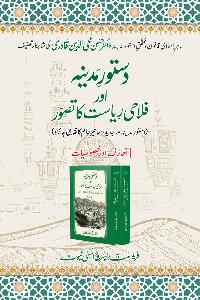The Constitution of Medina’s Notable Features
This book also has the distinction of listing the following 20 important features of the Constitution of Medina, which indicate its superiority to modern constitutions:
1. The Constitution of Medina has a universal status in terms of its details and contents. This constitutional document is a beacon of light for all nations of the world till the end of time.
2. The Constitution of Medina preserves the distinctive identity of each tribe and person. The identity of each tribe is recognized and its responsibilities are determined.
3. The Constitution of Medina adopts the principle of devolution of powers instead of centralization of powers. Each tribe and group was made the overseer and responsible for its internal affairs as far as possible.
4. The Constitution of Medina recognizes the importance of the individual and collective role in the formation of society and adopts the principle of transferring powers to the grassroots level.
5. The Constitution of Medina clarifies that the citizens of the state should carry out their mutual affairs with understanding, cooperation, mutual respect, and well-known and established methods.
6. The Constitution of Medina establishes relations between tribes and their allies on trust and credibility, and no one is allowed to be a cause of mutual discord and disunity. Principles have been laid down to deal with such elements with severity.
7. The Constitution of Medina also strengthens and consolidates the relations between the individuals of society so that mutual discord can be avoided.
8. The Constitution of Medina also takes care of the protection of religious beliefs and the preservation of morality and values.
9. The Constitution of Medina has adopted the principle of realism, taking into account human nature and the customs and traditions of Arab society, and maintaining them within the circle of Shariah and civilization.
10. In the execution of the ordinances and transactions, special attention has been paid to moderation and balance.
11. The Constitution of Medina denies tribalism based on ignorance and fanaticism.
12. This constitution has laid down principles and regulations to promote religious tolerance.
13. The prohibition of extending the sin or crime of one individual to the entire tribe or community has been prohibited.
14. Not only was the establishment of Parliament implemented through the Constitution of Medina, but the culture of making all decisions through mutual consultation was also promoted.
15. In this constitution, the close connection and relationship between religion and politics has been explained and religion is not considered separate from politics like other religions.
16. The importance of fear and awe and civilization and culture has been highlighted through the Constitution of Medina in Arab society and the citizens of the state.
17. The word nation has been used as a political term under the Constitution of Medina instead of a religious term, so that tolerance can be promoted among a multi-religious and multicultural society.
18. In the Constitution of Medina, those customs and traditions of the pre-Islamic era were maintained which were not in conflict with Islamic law. This shows the intellectual expansion and accommodating attitude of Islam.
19. Strict principles and laws have been laid down in the Constitution of Medina to ensure the peace and order of the state.
20. Through the Constitution of Medina, the principles of mutual peace and harmony and interaction among the citizens of the state have been promoted.
Copyrights © 2024 Minhaj-ul-Quran International. All rights reserved




![The Constitution of Medina & The Concept of the Welfare State [Introduction and Salient Features]](https://minhajbooks.com/images-books/thumbnails200/The-Constitution-of-Medina-amp-The-Concept-of-the-Welfare-State-Introduction-and-Salient-Features-Dr-Hassan-Qadri_722.jpg)